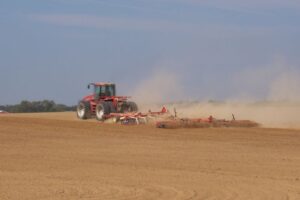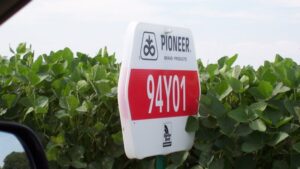Landscape, Ornamentals, Nursery, and Turf Edition
Seasonal updates on ornamental, nursery, and turf pests.
Subscriptions are available via EMAIL and RSS.
Companion Website Links:
 Rutgers Turf Blog - Articles on turfgrass diseases and cultural practices for the commercial turfgrass industry. Subscription available via RSS.
Rutgers Turf Blog - Articles on turfgrass diseases and cultural practices for the commercial turfgrass industry. Subscription available via RSS.
 Rutgers Weather Forecasting - Meteorological Information important to commercial agriculture.
Rutgers Weather Forecasting - Meteorological Information important to commercial agriculture.
EPA Releases Testing Data Showing PFAS Contamination from Fluorinated Containers
IPM vs. PHC: Is There a Difference?
History
During the late 1950’s and early 1960’s, Integrated Pest Management (IPM) was an approach to field crop management that farmers increasingly began to practice in the United States. It took barely a decade for farm agriculture to fully realize the problems associated with the over-reliance on pesticides when controlling pests. The classic example of the overuse of the chlorinated hydrocarbon (DDT) immediately comes to mind. Despite the astonishing success that synthetic pesticides usually have at killing pests, some have failed with disastrous results. This especially has occurred when the same material was used repeatedly over extended periods of time. For this reason, the IPM approach became necessary for US farmers managing extensive row crops. Approximately 20-25 years after farmers began implementing IPM methods, the landscaping or “green industry” started to gradually incorporate IPM methods into their service programs.

US Agriculture initially began to practice IPM with extensive row crop farming more than 60 years ago. (Photo Credit: Steven K. Rettke, Rutgers Coop. Ext.)

The use of GMO’s with crops such as Round-Up Ready soybeans & corn is certainly an IPM tactic, but emerging complications are a concern. (Photo Credit: Steven K. Rettke, Rutgers Coop. Ext.)
Value-Added Producer Grants in New Jersey
Grant.gov applications are due by April 29, 2021 and
paper applications must be postmarked by May 4, 2021
The Value-Added Producer Grant (VAPG) program administered by the USDA’s Rural Development Agency (RD), helps agricultural producers enter into value-added activities related to the processing and marketing of new products. The goals of this program are to generate new products, create and expand marketing opportunities, and increase producer income. [Read more…]
Covid Update From Secretary of Agriculture
March 5, 2021
COVID-19 Vaccine Update
Dear Farm Owner/Operator:
On March 1, 2021 Governor Murphy announced that farmworkers will be eligible for the COVID-19 vaccine starting March 15, 2021.
We understand that the ag community is anxious to have everyone on their farm vaccinated as soon as possible, especially since some of you already have workers in the field.
Here is how the vaccination program will roll out over the next week:
- The Department of Health (DOH) will send out a vaccine Q&A.
- A brief survey will be included in that email that will help them with supply and delivery planning. Survey questions will include:
- Business location
- Contact person for scheduling vaccinations
- Number of workers to be vaccinated
- Logistic considerations
Once you receive the survey, please fill it out and return it as directed to the DOH.
A Health official will follow up with your contact person to schedule vaccinations either on your farm or at a standing location.
Sincerely,
Douglas H. Fisher
Secretary
Upcoming ornamental meetings, webinars, and Boxwood Blight resources
Virtual education opportunities and digital resources update.
Virtual Meetings:
NJLCA – University 2021 (online)
- March 8, 12, 15th (multiple sessions per day)
- APLD – 1.5, LIC (NALP) available
- Click here for schedule and registration details
NJNLA – Total Pro (online)
- March 9-10th & 16-17th (8:30am-3:30pm)
- Many recertification credits and types available
- Click here for schedule and registration details
2021 –Rutgers– Central Jersey Turf & Ornamentals Institute (online)
- March 17th (2:00-5:30pm)
- Pesticide recertification credits: Core (1); 1A(3); 3A(1); 3B(2); 6B(2); 8C(2); 9(1); PP2(3)
- Click here for schedule and registration details
2021 –Rutgers– 30th Anniversary Rutgers Turfgrass Symposium (online)
- March 18th (9:00am-4:15pm)
- Click here for schedule and registration details
FREE-Webinars:
HRI tHrive Series (all taught by international experts):
- Seeing Red? – Problems with and management options for redheaded flea beetles in nurseries
- FREE!
- March 10th (11:00am)
- Click here to register
- International Boxwood Blight Series: Germany – A 15-Year Love-Hate Relationship
- FREE!
- March 18th (1:00pm)
- Click here to register
- Plant Benefits or Features – Which Cue is More Effective?
- FREE!
- April 15th (1:00pm)
- Click here to register
Boxwood Blight Resources
- Become a Boxwood Blight Advocate to receive quarterly updates
- CLICK HERE FOR A FREE DOWNLOAD – BOXWOOD HEALTH, Best Management Practices Production and Landscape Management (18 pages – Version 3.0)
Please contact Timothy J. Waller with any questions: twaller@njaes.rutgers.edu
2021 Central Jersey Turf & Ornamentals Institute Goes Virtual on March 17 – 2:00-5:30pm
 Go to: https://go.rutgers.edu/unlavof5 or use the QR code for details and registration.
Go to: https://go.rutgers.edu/unlavof5 or use the QR code for details and registration.
This annual event is brought to you by Rutgers Cooperative Extension of Middlesex, Monmouth, Mercer, Burlington, Ocean & Somerset Counties.
Seminar topics will benefit those who work in grounds maintenance including school board members, maintenance supervisors, employees of highways, parks, cemeteries, industrial grounds, lawn & home ground services, garden center and nurserymen operators.
2:05–2:35pm Pesticide Safety & IPM Program Update
2:40–3:10pm Weed Management Updates for Landscape Turf
3:15–3:45pm Using Growing Degree Day Models as Part of Your IPM Program
3:50–4:20pm Effects of Climate on Soil Nutrients, pH, & Organic Matter
4:25–4:55pm Spotted Lanternfly Monitoring & Control
5:00–5:30pm Sustainable Landscape Plants for Your IPM Program
5:30pm Closing Remarks
|
Pesticide Recertification Credits Available |
|
| CATEGORY | #Units |
| Core (Basic Safety and Handling) | 1 |
| 1A (Agricultural Plant) | 3 |
| 3A (Ornamentals) | 1 |
| 3B (Turf) | 2 |
| 6B (Right-A-Way) | 2 |
| 8C (Campground) | 2 |
| 9 (Regulatory) | 1 |
| PP2 (Private Applicator Category) | 3 |
